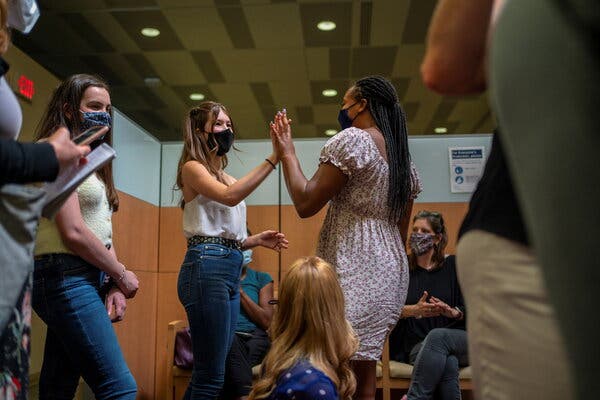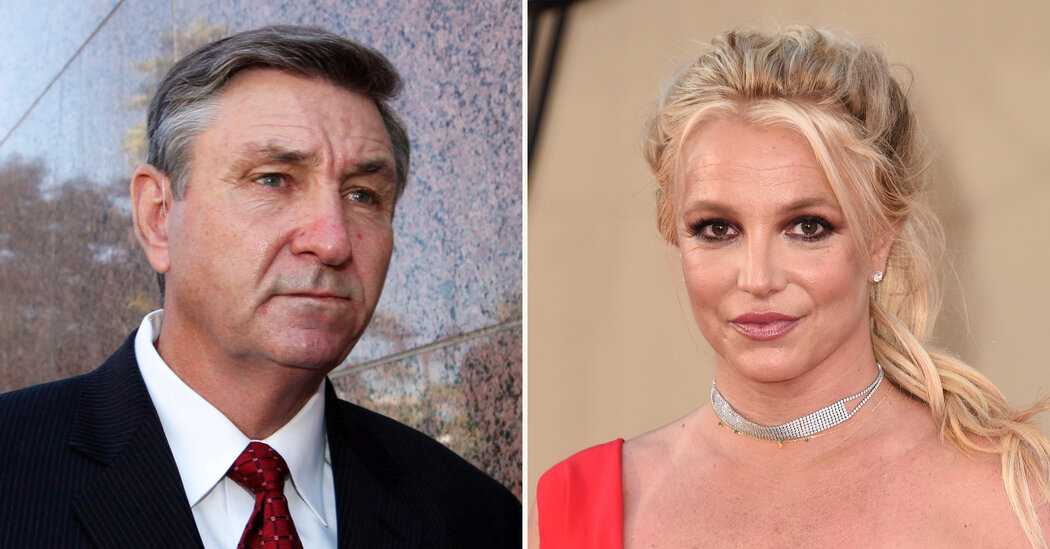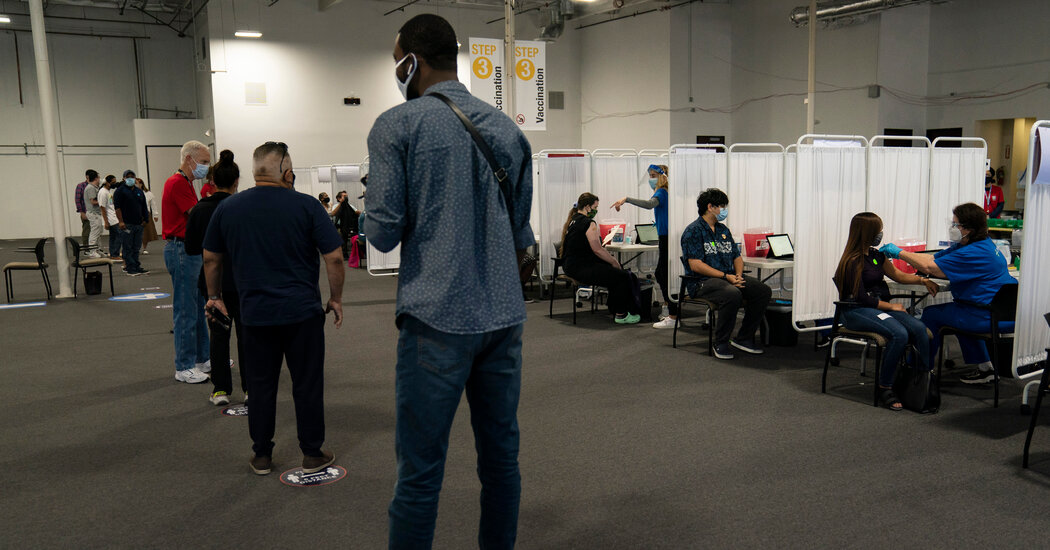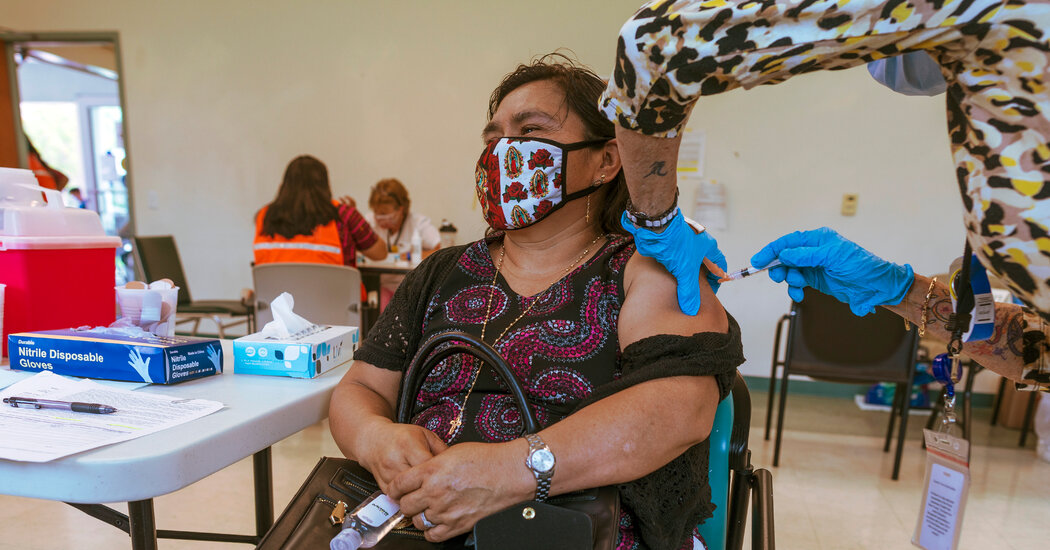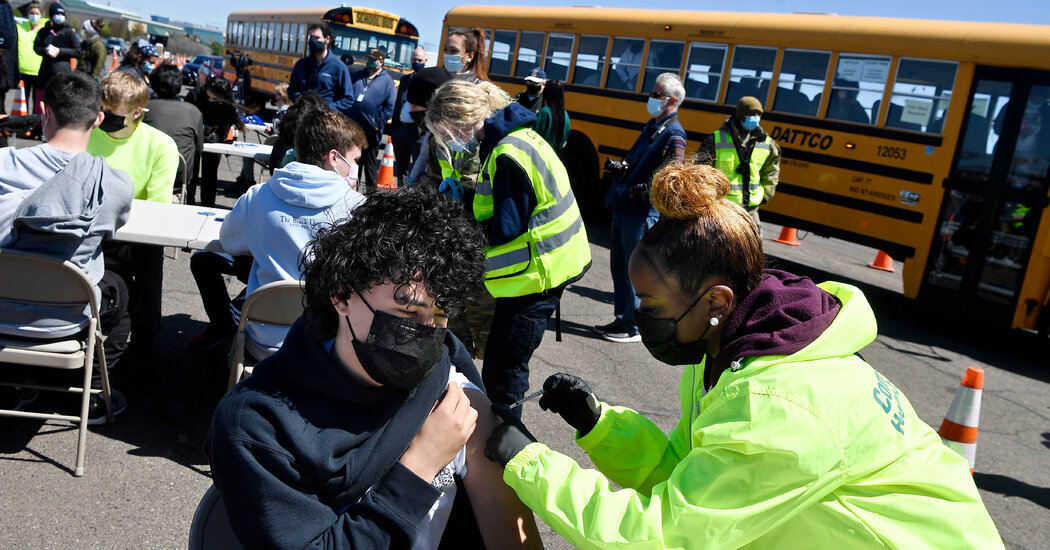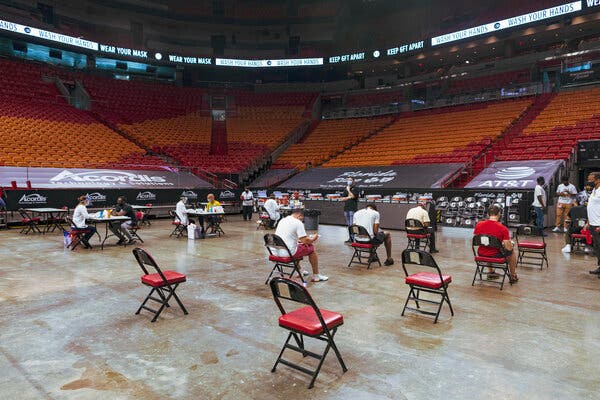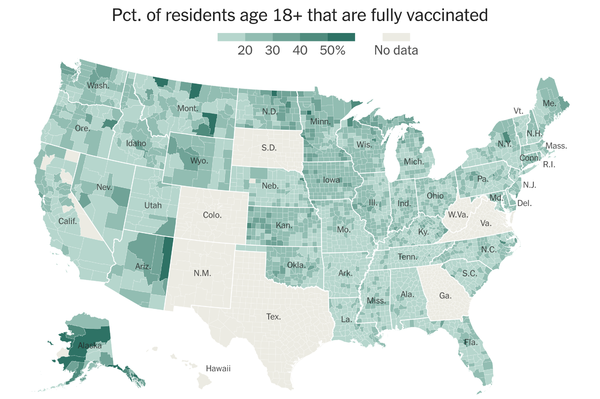As Parents Forbid Covid Shots, Defiant Teenagers Seek Ways to Get Them
Most medical consent laws require parental permission for minors to get a vaccine. Now some places are easing restrictions for Covid shots while others are proposing new ones.Teenagers keep all sorts of secrets from their parents. Drinking. Sex. Lousy grades.But the secret that Elizabeth, 17, a rising high-school senior from New York City, keeps from hers is new to the buffet of adolescent misdeeds. She doesn’t want her parents to know that she is vaccinated against Covid-19.Her divorced parents have equal say over her health care. Although her mother strongly favors the vaccine, her father angrily opposes it and has threatened to sue her mother if Elizabeth gets the shot. Elizabeth is keeping her secret not only from her father, but also her mother, so her mom can have plausible deniability. (Elizabeth asked to be identified only by her middle name.)The vaccination of children is crucial to achieving broad immunity to the coronavirus and returning to normal school and work routines. But though Covid vaccines have been authorized for children as young as 12, many parents, worried about side effects and frightened by the newness of the shots, have held off from permitting their children to get them.A recent poll by the Kaiser Family Foundation found that only three in 10 parents of children between the ages of 12 through 17 intended to allow them to be vaccinated immediately. Many say they will wait for long-term safety data or the prod of a school mandate. But with many teenagers eager to get shots that they see as unlocking freedoms denied during the pandemic, tensions are crackling in homes in which parents are holding to a hard no.Forty states require parental consent for vaccination of minors under 18, and Nebraska sets the age at 19. (Some states carve out exemptions for teenagers who are homeless or emancipated.) Now, because of the Covid crisis, some states and cities are seeking to relax medical consent rules, emulating statutes that permit minors to obtain the HPV vaccine, which prevents some cancers caused by a sexually transmitted virus.Last fall, the District of Columbia City Council voted to allow children as young as 11 to get recommended vaccines without parental consent. New Jersey and New York Legislatures have bills pending that would allow children as young as 14 to consent to vaccines; Minnesota has one that would permit some children as young as 12 to consent to Covid shots.But other states are marching in the opposite direction. Although South Carolina teenagers can consent at 16, and doctors may perform certain medically necessary procedures without parental permission on even younger children, a bill in the Legislature would explicitly bar providers from giving the Covid shot without parental consent to minors. In Oregon, where the age of medical consent is 15, Linn County ordered county-run clinics to obtain parental consent for the Covid shot for anyone under 18. According to the National Conference of State Legislatures, which has been tracking Covid-related bills, some states, including Tennessee and Alabama, are working on legislation to prevent public schools from requiring Covid shots.The issue of who can consent to the Covid shots is providing fresh context for decades-old legal, ethical and medical questions. When parents disagree, who is the arbiter? At what age are children capable of making their own health decisions and how should that be determined?“Isabella wants it because her friends are getting it, and she doesn’t want to wear a mask,” said Charisse, a mother of a 17-year-old in Delray Beach, Fla., who asked that her last name be withheld for family privacy. Charisse fears the shot could have an effect on her daughter’s reproductive system (a misperception that public health officials have repeatedly refuted).“Isabella said, ‘It’s my body.’ And I said, ‘Well, it’s my body until you’re 18.’”Many teenagers see the Covid shot as unlocking freedoms denied to them during the pandemic. In New Orleans, Ava Kreutziger, 14, left, high-fives Croix Hill, 15, after Croix received her first dose.Kathleen Flynn/ReutersAs both the legal debates and family arguments unfold, those administering the vaccine at pharmacies, clinics and medical offices are trying to determine how to proceed when a young teen shows up for the Covid shot without a parent.“We may be in a legal gray zone with this vaccine,” said Dr. Sterling Ransone Jr., a family physician in Deltaville, Va. In his health system, a parent can send a signed consent form for a teenager to be vaccinated. But because the Covid vaccine is authorized only for emergency use, the health system requires a parent to be present for a patient under 18 to get that shot.Marina, 15, who lives in Palm Beach County, Fla., — and who, like others interviewed, asked not to be fully identified — longs for the shot. But her mother says absolutely not. The subject is not open for discussion.And so Marina has been excluded from the social life she covets. “Five of my friends are throwing a party and they invited me, but then they said, ‘Are you vaccinated?’” she said. “So I can’t go. That hurts.”As the pandemic ebbs, some teen social circles are reconstituting based on vaccination status. “I see my friends posting on social media — ‘Woo-Hoo I got it!’ — and now when I see them, they ask me things like, ‘Where have you been? Are you traveling a lot? Are you sure you don’t have Covid?’ It sucks that I can’t get the shot,” Marina continued.Increasingly, frustrated teenagers are searching for ways to be vaccinated without their parents’ consent. Some have found their way to VaxTeen.org, a vaccine information site run by Kelly Danielpour, a Los Angeles teenager.The site offers guides to state consent laws, links to clinics, resources on straightforward information about Covid-19 and advice for how teenagers can engage parents.“Someone will ask me, ‘I need to be able to consent at a vaccine clinic that is open on weekends and that is on my bus route. Can you help?’” said Ms. Danielpour, 18, who will begin her freshman year at Stanford in the fall.She started the site two years ago, well before Covid. The daughter of a pediatric neurosurgeon and an intellectual property lawyer, she realized that most adolescents know neither the recommended vaccine schedule nor their rights.“We automatically talk about parents but not about teens as having opinions on this issue,” she said. “I decided I needed to help.” Ms. Danielpour wrangled experts to help her understand vaccination and consent laws, and she recruited teenagers to be “VaxTeen ambassadors.”“I want teenagers to be able to say to pediatricians, ‘Hey, I have this right,’” added Ms. Danielpour, who gives talks at conferences to physicians and health department officials.In Los Angeles, Kelly Danielpour, 18, started VaxTeen.org, a site that lists state health care consent laws, vaccine clinic locations and advice for how teens can address vaccine hesitancy in their parents.Jessica Pons for The New York TimesElizabeth surreptitiously got her vaccine at a school pop-up clinic.After administrators at her boarding school informed parents they would be offering Covid shots, her mother gave permission. Her father forbade it. Upset, Elizabeth consulted the school nurse, who said she could not be vaccinated without approval from both. Elizabeth researched state laws, learning that she wasn’t old enough to consent on her own.She showed up anyway. At worst, she figured, the school would just turn her away.Apparently, they took note only of her mother’s consent. Saying nothing, Elizabeth stuck out her arm.Now she is in a pickle. The school is requiring students to be vaccinated for the fall semester and she says her father has begun warring with the administration over the issue. Elizabeth is afraid that if he learns how she was vaccinated, he will be furious and tell the school, which will discipline her for having deceived vaccinators, a stain on her record just as she is applying to college.Gregory D. Zimet, a psychologist and professor of pediatrics at Indiana University School of Medicine, pointed out the irony of an adolescent being legally prevented from making a choice that was strenuously urged by public health officials.Developmentally, he said, adolescents at 14 and even younger are at least as good as adults at weighing the risks of a vaccine. “Which isn’t to say that adults are necessarily great at it,” he added.In many states, young teenagers can make decisions around contraception and sexually transmitted infections, which are, he noted, “in many ways more complex and fraught than getting a vaccine.”Pediatricians say that even parents who have themselves been vaccinated are wary for their children. Dr. Jay Lee, a family physician and chief medical officer of Share Our Selves, a community health network in Orange County, Calif., said parents say they would rather risk their child having Covid than get the new vaccine.“I will validate their concerns,” Dr. Lee said, “but I point out that waiting to see if your child gets sick is not a good strategy. And that no, Covid is not just like the flu.”Elise Yarnell, a senior clinic operations manager for the Portland, Ore., area at Providence, a large health care system, recalled a 16-year-old girl who showed up at a Covid vaccine clinic at her school in Yamhill County.Her parents oppose the vaccine so she wanted to get it without them knowing, which she could do legally because Oregon’s age of consent is 15. She teared up when she saw the shots were not ready before she had to be home, but she was able to return that night without alerting her parents and was vaccinated.“She was extremely relieved,” Ms. Yarnell said.Isabella is the 17-year-old daughter of Charisse, the Delray Beach, Fla., mother who refuses to grant permission for the vaccine. Asked why she wanted the shot, Isabella gave a stream of reasons. “A lot of older people in my family are at risk for catching Covid and possibly dying,” she said. “I want to get the vaccine so I can be around them, and they’ll be safe. And then I can go out with my friends again, and they won’t be so much at risk either.”Although doctors have been trying to instill vaccine confidence in parents as well as patients, there’s not much they can do when parents object. Recently, Dr. Mobeen H. Rathore, a pediatrics professor at the University of Florida medical college in Jacksonville, told a patient whose mother refused consent that she couldn’t get the Covid vaccine until she turned 18, three weeks hence.“She got vaccinated on her birthday,” Dr. Rathore said. “She sent me a message saying that was her birthday gift to herself.”
Read more →
